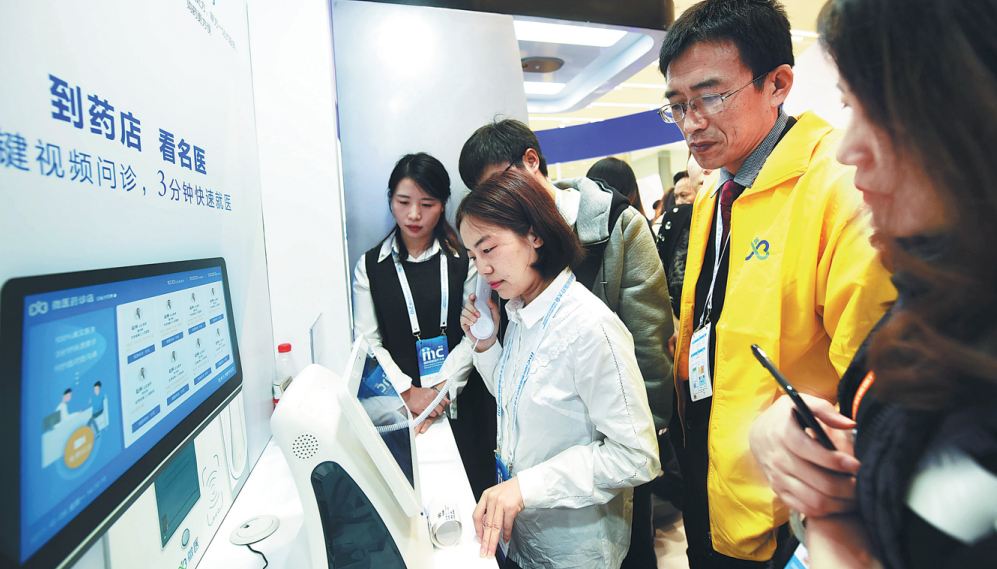Online hospitals link doctors, patients


Healthcare firms jumping on the bandwagon as new rules widen service scope
China's leading internet healthcare companies are foraying deeper into the medical service sector by establishing online hospitals, as the authorities have given them the green light to expand their service scope.
On April 25, the General Office of the State Council issued a guideline allowing internet companies to operate online hospitals, as long as they anchor their services to brick-and-mortar hospitals.
Online medical services remain restricted to patients with chronic or common diseases, and are only permitted for follow-up consultation and treatment.
The guideline also encourages the application of e-prescriptions, improving convenience for patients purchasing medicine via internet platforms.
Another new regulation released by the National Health Commission on Sept 14 clarified certain definitions and rules relating to online healthcare services.
Previously, online healthcare platforms could only provide services facilitating medical care, such as listing doctors' ratings and arranging appointments.
The market has become very popular in recent years, with leading companies, such as Haodf.com and WeDoctor, having reported exponential growth.
Haodf.com, founded in 2006, officially established its online hospital in 2016 in Yinchuan, capital of the Ningxia Hui autonomous region. It said that more than 16,500 doctors across the country had registered on the online hospital by August, and had served about 7.5 million online patients.
WeDoctor, founded in 2010, established Wuzhen Internet Hospital in late 2015. It said its online platform now provides medical services to 60,000 patients a day on average, more than any hospital in China.
The online healthcare market was valued at about 200 million yuan ($28.8 million) in 2009, but soared to 22.3 billion yuan in 2016, and is estimated to exceed 90 billion yuan by 2020, according to a Sootoo Research Institute report.
Beijing-headquartered think tank iyiou.com said in a recent report that there were 55 internet hospitals in China by May 2018, and most of them are jointly established by internet healthcare companies and local hospitals.
Development drive
Analysts said the rule change underlines China's supply-side reform in the healthcare sector and will help to drive internet healthcare companies' development forward.
"The combination of the internet and hospitals can help people in underprivileged regions gain better access to quality medical care from developed regions," said Wang Chuan, director of the big data management and service bureau of Yinchuan.
Wang made the remarks at a recent internet and healthcare forum in Yinchuan, as the city is spearheading internet healthcare service development.
Yue Wei, deputy director of the infectious disease department of the First People's Hospital of Yunnan Province, said online hospitals not only help patients, but also doctors.
"Online hospitals can help to create complete medical records for patients, making patient data management much more convenient," he said.
Medlinker, an online healthcare startup with a market value of more than 7 billion yuan, is also making online hospitals a key channel to expand its business. On July 31, Medlinker secured a 1 billion yuan investment in its fourth round of funding, from investors including China Investment Financial Holdings and Sequoia Capital China.
Wang Shirui, founder and CEO of Medlinker, attributed the company's success to good market and policy sense. Founded in 2014 in Chengdu, capital of Southeast China's Sichuan province, as a social and academic platform for doctors, Medlinker has registered more than 500,000 verified doctors and established two online hospitals.
One of the online hospitals is based in Yinchuan and the other in Rizhao, Shandong province. But their influence reaches far further.
More than 20,000 doctors nationwide have registered to provide services through the two online hospitals - 57 percent of them are from first-tier hospitals and 22 percent are established professionals, Medlinker said.
Through the online hospitals, doctors can serve any patient with internet access and keep in contact to provide consistent professional medical advice.
One example is a charity program Medlinker initiated with pharmaceutical company Gilead, to offer convenient and high-quality online healthcare services for hepatitis C patients, which has served 4,000 people nationwide.
"Chronic diseases involve complicated diagnosis and treatment processes, which often require patients to visit hospitals regularly, many of whom live in remote regions," said Yue.
"Through online hospitals, patients can seek doctors' advice without going to a hospital each time, and get medication more easily thanks to e-prescriptions, thus significantly reducing their time and economic burden," he said, adding that several of his patients are on the program.
Medlinker CEO Wang said online hospitals and e-prescription are key to the sustainable development of healthcare platforms.
"The performance of online hospitals will depend on providing e-prescriptions, which is just as important as the size and number of patients for brick-and-mortar hospitals," Wang said.
Medlinker's online hospitals are cooperating with hundreds of brick-and-mortar hospitals across the country, most of which are private. The company also plans to cooperate with drugstores, from which people can buy medicines near their homes with e-prescriptions from verified doctors from online hospitals, according to Wang.
Other companies, such as WeDoctor and Haodf.com, are also cooperating with pharmaceutical distributors to offer patients online medicine shopping services.
Yang Jieqi, a healthcare analyst at XinSanban Think Tank, said the online healthcare sector is set to develop more healthily, driven by the new regulation as well as market potential.
Online doctor-patient communication is often conducted through tools such as cameras, instant messaging and photos, instead of face-to-face interaction, making it risky when treating acute and complicated diseases, Yang said. But the new regulation has made it very clear that doctors are only allowed to provide online medical advice and e-prescriptions to patients with chronic or minor ailments for follow-up treatment, which will help reinforce industrial ethics, she said.
The new regulation has raised criteria for market players, as it outlines detailed requirements for internet healthcare platforms and their responsibilities, which will help reshape the sector for the better, Yang said.
Zhao Xuezhu contributed to the story.




































